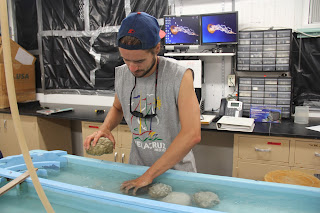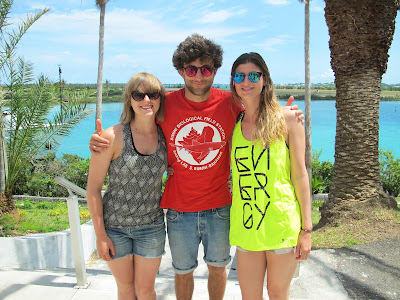You may have met some of our Bermuda
Program Interns last week on Ocean Academy's blog,
http://biosoceanacademy.blogspot.com/2015/07/bermuda-program-interns-part-1.html,
but we would also like to introduce some of our Summer Interns!
The
Bermuda Institute of Ocean Sciences (BIOS) offers internship opportunities to both
undergraduate and recent graduate students. Internships may run
for 8, 10 or 12 weeks in the summer, with flexible timing and duration.
BIOS interns can expect to work in BIOS laboratories with faculty and staff
mentors, participating in active research projects of mutual interest. A
BIOS intern could have the opportunity to participate in an
open-ocean research cruise aboard the R/V Atlantic
Explorer, SCUBA dive on Bermuda’s coral reefs, learn progressive
techniques from scientists at the forefront of their field, gain hands-on
experience with cutting-edge laboratory equipment, and engage in workshops and seminars
with peers and BIOS staff.
Meet Darlene!
Darlene is a fourth year undergraduate student at Dalhousie University
studying Marine Biology. This is a
second career for Darlene, who previously worked as a chemical technologist in
various labs. Darlene has always had a love of the
ocean, and with her involvement in BIOS Darlene says, “everything is coming
together now.”
1. How would you describe the project you have worked on at BIOS?
My main project is to clear space in the
library for the new interactive classroom, the Mid-Atlantic Glider Initiative Collaboration (MAGIC) Room. The MAGIC Room will have
multiple large screens and on those screens you will be able to view the BIOS
gliders in real time. The gliders are
remote controlled AUVs (autonomous underwater vehicles). The classroom is going to be a great learning
tool for the students and visitors who come through here because they’ll get to
see the gliders gathering data in real time.
2. I see you took a course here at BIOS last summer. Can you tell me about that experience and
also why you chose to return for an internship this summer?
I took the Coral Reef Ecology course as a
Dalhousie student last summer here at BIOS, and really enjoyed everything about
it—the instructors and the Institute. I
enjoyed the course so much that when I heard that they were looking for someone
to help in the library, I jumped at the chance to return and be a part of the
project.
3. Why did you choose BIOS?
I chose BIOS because of the coral reefs and
location, and the fact that it is a top-notch facility with renowned scientists
working here. I would definitely promote
it to any other intern who wants to come here because I know they are going
have a good experience and get a good education.
I just get such a good feeling when I am
here. Everyone is so friendly, so
welcoming. How would you not have a good
time here? It’s just not possible.
~~~~~~~~~~~~~~~~~~~~~~~~~~~~~~~~~~~~~~~~~~~~~~~~~~~
Meet Brett!
Brett is a
fourth year Marine Biology student at Dalhousie University. This summer Brett is working as a volunteer
intern under Dr. Eric Hochberg. His
research this summer is part of his honors thesis, “The Effects of C02 on Coral Reef
Primary Productivity.”
1. How would you describe the project you are working on at BIOS?
We’re studying how C02 emissions,
and ocean acidification due to increasing carbon emissions, affect coral reefs’
function.
2. Why did you choose BIOS?
I found about BIOS through Dalhousie
University. I was in oceanography course,
which was the first ocean focused course that I took in university, and my
professor suggested that I apply for the scholarship to take the BIOS Coral Reef
Ecology class this summer. I researched
BIOS and read about it, and the more I read, the more excited I got. So I applied for the scholarship and decided
3 weeks wouldn’t be enough, so I looked into how I could do some research for
my honors thesis and Eric agreed to help me out.
3. Has anything in particular impressed you while you have been at BIOS?
The attitude of everyone; everyone is
really open and welcoming and passionate about his or her work. Everyone is really excited to come to work in
the morning, and excited to talk about what they’re doing.
~~~~~~~~~~~~~~~~~~~~~~~~~~~~~~~~~~~~~~~~~~~~~~~~~~
Stay posted to meet more of our great Summer Interns here at BIOS!










